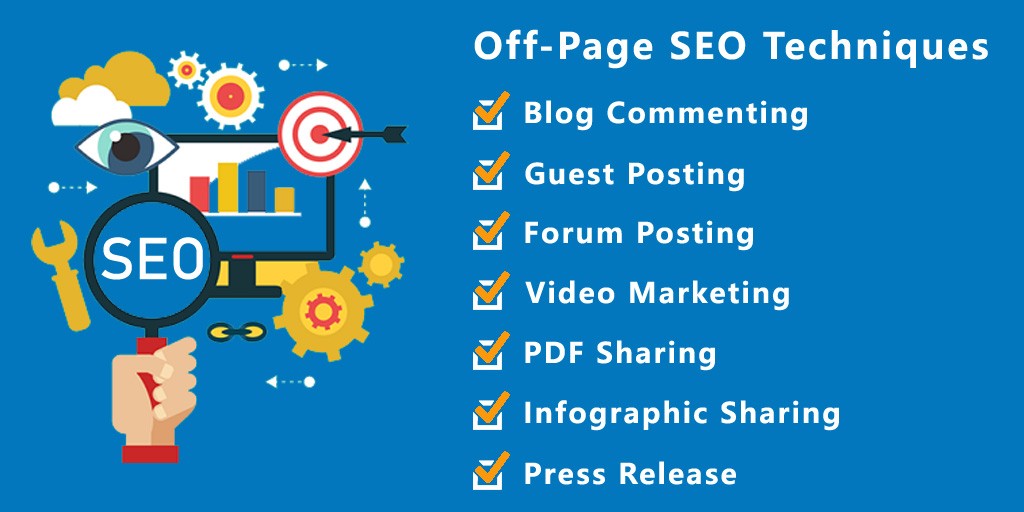- support@microwebsolutions.co
- Kanpur U.P-208021
Off Page SEO

Off-page SEO refers to the activities conducted outside of your own website to improve its search engine rankings and increase its online visibility. Unlike on-page SEO, which involves optimizing the content and structure of your website, off-page SEO focuses on building your website's reputation and authority on the internet. Here are some common off-page SEO techniques:
-
Link Building: This is the process of acquiring high-quality backlinks from other websites to your own. Backlinks are considered votes of confidence, and search engines view websites with a higher number of quality backlinks as more authoritative. You can earn backlinks through guest posting, content promotion, influencer outreach, and building relationships with other website owners.
-
Social Media Marketing: Engaging with your audience on social media platforms can help increase brand awareness and drive traffic to your website. By sharing valuable content, encouraging social sharing, and interacting with your followers, you can expand your online presence and improve your website's visibility.
-
Social Bookmarking: Submitting your website or blog posts to social bookmarking sites like Reddit, Digg, and StumbleUpon can help drive traffic to your site. It allows users to discover and share content, which can generate backlinks and increase your website's exposure.
-
Online Reputation Management: Monitoring and managing your online reputation is crucial for off-page SEO. Encourage positive reviews, respond to customer feedback, and address any negative comments or complaints promptly and professionally. A positive online reputation can enhance your website's credibility and attract more visitors.
-
Influencer Marketing: Collaborating with influencers or industry experts can amplify your brand's reach and attract new audiences. By partnering with influential individuals in your niche, you can gain exposure to their followers and benefit from their credibility and expertise.
-
Content Marketing: Creating high-quality and shareable content is a fundamental aspect of off-page SEO. When you produce valuable and engaging content, it has the potential to attract natural backlinks as people find it useful and worth referencing.
-
Local SEO: If you have a local business, optimizing your website for local searches is essential. Registering your business with online directories, optimizing Google My Business profile, and obtaining local citations can help improve your website's visibility in local search results.
Remember, off-page SEO requires a long-term approach, as it takes time to build relationships, earn backlinks, and grow your online presence. It's important to focus on quality rather than quantity, as search engines prioritize high-quality and relevant links over spammy ones.
Frequently Asked Question
Sure! I can help answer frequently asked questions. Please go ahead and ask your question, and I'll do my best to provide you with a helpful response.
-
What is digital marketing?Digital marketing refers to the use of various digital channels and strategies to promote products, services, or brands online. It encompasses activities such as search engine optimization (SEO), social media marketing, content marketing, email marketing, and paid advertising, among others.
-
Why is digital marketing important?Digital marketing is essential because it allows businesses to reach a wider audience, target specific demographics, measure and track results, and interact with customers in real time. It offers cost-effective marketing solutions and provides opportunities for businesses to enhance their online visibility and brand reputation.
-
What are the key components of a digital marketing strategy?A digital marketing strategy typically includes:
Defining goals and objectives.
Identifying the target audience.
Conducting market research and competitor analysis.
Selecting the appropriate digital marketing channels.
Developing compelling content and creative assets.
Implementing campaigns and tactics.
Analyzing and measuring results.
Making data-driven adjustments and optimizations. -
How can I improve my website's search engine ranking?To improve your website's search engine ranking, consider the following:
Conduct keyword research and optimize your website's content with relevant keywords.
Ensure your website has a user-friendly design and good site structure.
Optimize meta tags, titles, and descriptions.
Build high-quality backlinks from reputable websites.
Create and publish fresh, engaging, and shareable content regularly.
Improve page load speed and mobile-friendliness.
Use alt tags for images and optimize multimedia elements.
Encourage social sharing and engagement.
-
What is social media marketing, and how can it benefit my business?Social media marketing involves using social media platforms like Facebook, Instagram, Twitter, LinkedIn, and others to promote products, services, or brands. It can benefit your business by:
Increasing brand awareness and exposure.
Building and nurturing a community of loyal followers.
Driving website traffic and generating leads.
Engaging directly with customers and receiving feedback.
Enhancing brand reputation and credibility.
Facilitating targeted advertising to reach specific demographics.
Conducting market research and gathering insights.
-
How can I measure the success of my digital marketing efforts?You can measure the success of your digital marketing efforts by tracking key performance indicators (KPIs) that align with your goals. Some common KPIs include:
Website traffic and page views.
Conversion rates and sales.
Click-through rates (CTRs) for ads and emails.
Social media engagement metrics (likes, shares, comments).
Return on investment (ROI) from advertising campaigns.
Customer acquisition cost (CAC) and customer lifetime value (CLV).
Email open and click rates.
Search engine ranking and organic search traffic.
-
What are some effective email marketing strategies?To enhance your email marketing efforts, consider the following strategies:
Personalize your emails based on recipient data and preferences.
Segment your email list to send targeted messages.
Craft compelling subject lines to improve open rates.
Provide valuable content and offers to engage subscribers.
Use clear and visually appealing email designs.
Optimize for mobile devices.
Test different email variations and analyze performance.
Automate email sequences for lead nurturing and customer onboarding.


